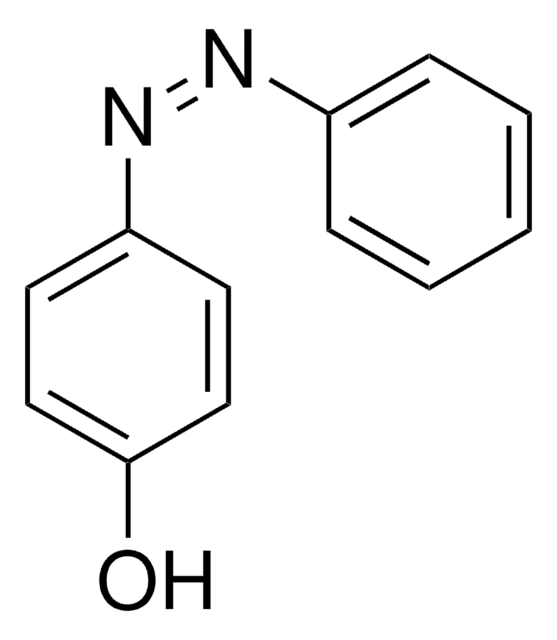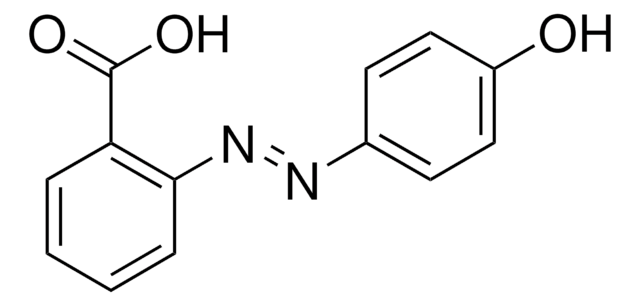479624
4-(Phenylazo)benzoic acid
98%
Synonym(s):
4-(2-Phenyldiazenyl)benzoic acid, 4-Carboxyazobenzene, Azobenzene-4-carboxylic acid, Azoic acid, p-Phenylazobenzoic acid
Sign Into View Organizational & Contract Pricing
All Photos(1)
About This Item
Linear Formula:
C6H5N=NC6H4CO2H
CAS Number:
Molecular Weight:
226.23
EC Number:
MDL number:
UNSPSC Code:
12352100
PubChem Substance ID:
NACRES:
NA.22
Recommended Products
Quality Level
Assay
98%
mp
247-250 °C (lit.)
SMILES string
OC(=O)c1ccc(cc1)\N=N\c2ccccc2
InChI
1S/C13H10N2O2/c16-13(17)10-6-8-12(9-7-10)15-14-11-4-2-1-3-5-11/h1-9H,(H,16,17)/b15-14+
InChI key
CSPTZWQFHBVOLO-CCEZHUSRSA-N
Related Categories
General description
4-(Phenylazo)benzoic acid (PABA), an azobenzene derivative, is a photo-isomerisable molecule. It can be synthesized by reacting p-aminobenzoic acid with nitrosobenzene. The interaction of PABA with TiO2 and ZnO electrodes has been investigated. A photoreversible switch has been developed using dimethylamino calix[4]arene and PABA. The post functionalization of poly(hydroxyethyl acrylate) core cross-linked star polymers with PABA induces an ability to complex with α-cyclodextrin.
Application
4-(Phenylazo)benzoic acid may be used in the preparation of a novel photochromic ZrO2 precursor solution.
Signal Word
Warning
Hazard Statements
Precautionary Statements
Hazard Classifications
Eye Irrit. 2 - Skin Irrit. 2 - STOT SE 3
Target Organs
Respiratory system
Storage Class Code
11 - Combustible Solids
WGK
WGK 3
Flash Point(F)
Not applicable
Flash Point(C)
Not applicable
Choose from one of the most recent versions:
Already Own This Product?
Find documentation for the products that you have recently purchased in the Document Library.
Customers Also Viewed
Synthesis of a new photochromic ZrO2 precursor for preparation of functional thin films.
Nishizawa K, et al.
Key Engineering Materials, 320, 175- 178 (2006)
Chao Luo et al.
Advanced materials (Deerfield Beach, Fla.), 30(23), e1706498-e1706498 (2018-04-25)
Organic compounds are desirable alternatives for sustainable lithium-ion battery electrodes. However, the electrochemical properties of state-of-the-art organic electrodes are still worse than commercial inorganic counterparts. Here, a new chemistry is reported based on the electrochemical conversion of nitro compounds to
Azobenzene-Functionalised Core Cross-Linked Star Polymers and their Host-Guest Interactions.
Tan S, et al.
Australian Journal of Chemistry, 67(1), 173-178 (2014)
New dyes for solar cells based on nanostructured semiconducting metal oxides: Synthesis and characterisation of ruthenium (II) complexes with thiol-substituted ligands.
Ohlsson J, et al.
Journal of Photochemistry and Photobiology A: Chemistry, 148(1), 41-48 (2002)
A photoresponsive wettability switch based on a dimethylamino Calix[4]arene.
Zhang X, et al.
Chemistry (Weinheim An Der Bergstrasse, Germany), 20(30), 9367-9371 (2014)
Our team of scientists has experience in all areas of research including Life Science, Material Science, Chemical Synthesis, Chromatography, Analytical and many others.
Contact Technical Service
![4-[4-(Dimethylamino)phenylazo]benzoic acid N-succinimidyl ester ≥98.0% (HPLC)](/deepweb/assets/sigmaaldrich/product/structures/120/235/500b5276-3ce2-43b7-9588-3883f13d4ff7/640/500b5276-3ce2-43b7-9588-3883f13d4ff7.png)











